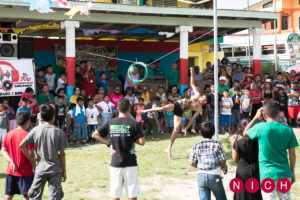Nicté Fuller Medina is a sociolinguist and currently the inaugural CLIR-Mellon fellow in data curation in Latin American and Caribbean studies at the University of California, Los Angeles @UCLALibrary. Find her on Twitter: @DrNicte.
A decolonial framework for repatriation of ephemera rests on challenging default colonial practices such as top-down approaches that center institutions and experts rather than community expertise, extractivist methods, and western notions of ownership. The project Language Culture and History: Belize in a Digital Age, adopting such a framework, reimagines legacy sociolinguistic data as cultural patrimony due to the overlap between sociolinguistic interviews and oral history. The overarching goals are to digitize, repatriate, and create an online repository of such interviews. This work begins with the Older Recordings of Belizean Varieties of Spanish (ORBS), which serve as a case study for developing a decolonial model for digital preservation and repatriation of other legacy datasets. Interviews contained in the ORBS were collected by Timothy W. Hagerty in 1978-79 for his doctoral dissertation and, recognizing the community cultural heritage contained in them, translations of several narratives were published in If Di Pin Neva Bend in 2012 by Hagerty together with Mary Gomez Parham.
March 2020 was to be a critical month for the project, as travel to Belize had been scheduled in order to locate interviewees, recruit local interns, lay groundwork for community consultations, and meet with the local institutional collaborator, the Institute for Social and Cultural Research. Thanks to previous relationship-building, this last goal could be accomplished virtually for the most part; however, the other work requires on-the-ground presence. To get permission to put interviews online, interviewees or family members must be located, a task that can only be done in Belize and with the assistance of local community organizations and networks. The capacity-building component to recruit and train interns is also best implemented in person. Likewise, community consultation requires face-to-face meetings. This consultation process is essential to challenging default practices and, perhaps more importantly, is an ethical imperative as outlined in the UNESCO Ethical Principles for Safeguarding Intangible Cultural Heritage. With the closing of borders because of the pandemic, however, this work cannot be carried out. Even when borders reopen, safety protocols will determine if and when group meetings and interactions with elderly interviewees may take place. This all forces a re-examination of project implementation.
The question becomes if and in what form the project can proceed. Thanks to the UCLA Library Preservation Studios, many of the interviews were previously digitized at preservation-quality standards. In addition, partial transcripts have also been digitized and interviews can be anonymized according to established protocols in

sociolinguistic research. Thus, major components for online access have been completed. However, without community and local institutional collaboration in Belize, the work remains within the confines of a traditional digitization project; it no longer challenges the practice of individual researchers and/or institutions being the sole decision makers in type of access, community representation, and stewardship. The immediate impact of COVID-19 highlights how integral in-person meetings, community participation, and travel are to decolonial praxis in transnational projects. In addition, as the economic impacts of the pandemic become clearer it may become increasingly challenging to work in ways that contest traditional approaches if funding is required to do so. Cultural heritage institutions in Belize rely indirectly on tourism, for example, and the fallout is not yet fully evident. Similarly, some international funding programs have paused or refocused awards and many libraries are anticipating budget cuts in the U.S. and potentially in other countries. This reality has resulted in funds specifically intended to mitigate the impacts of COVID-19 but even the availability of funding does not resolve these issues and adapting to the evolving circumstances is now an integral element of project management.
Thus, for the current project, the focus has shifted to aspects that do not require immediate community input and which take advantage of the materials that have already been digitally preserved. These include tasks such as creating searchable transcripts, editing and verifying metadata, and identifying the original interviews that correspond to the published narratives; meanwhile, continued discussions are being held with stakeholders on the way forward. This allows the project to proceed minimally while we await a clearer path to complete the aforementioned goals.
This is the twelfth piece in COVID (Re)Collections, a series exploring responses to the COVID-19 pandemic by library, cultural heritage, and information professionals. Stories are proposed by the authors/contributors and reflect their personal experiences and perspectives at the time of submission. Learn more about the series and share your own story here.

